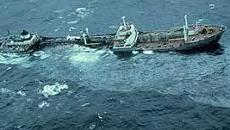The etymological origin of the word that concerns us now is found in Latin. Exactly it is the result of the sum of two different parts:
-The prefix “de-”, which indicates “from top to bottom”.
-The noun “ramus”, which is synonymous with “branch”.
The notion of spill is used synonymously with spilling : the process and result of spilling (pouring a liquid or something small). A fluid that leaves its container , usually due to some type of failure, is called a spill, therefore.
 For example: “Several environmental organizations reported that a large hydrocarbon spill occurred in the Indian Ocean,” “The accident was caused by an oil spill on the avenue,” “The sewage liquid spill caused a nauseating smell.”
For example: “Several environmental organizations reported that a large hydrocarbon spill occurred in the Indian Ocean,” “The accident was caused by an oil spill on the avenue,” “The sewage liquid spill caused a nauseating smell.”
Oil spill is a frequently occurring ecological problem. The transport of this hydrocarbon by water often faces problems that end with oil spilled into the sea or river. These spills can kill aquatic animals due to pollution and even affect coastlines for a long time.
The Exxon Valdez spill off the coast of Alaska in 1989 and the Prestige spill off Galicia , Spain , in 2002 are among the most serious spills in history .
In the field of medicine , a spill is called the leakage of a liquid from the vessel that contains it or the atypical accumulation of the same in a certain cavity of the body. A pleural effusion , in this sense, is a buildup of fluid in the pleura (a membrane that lines the lungs, diaphragm, and mediastinum). In a pericardial effusion , on the other hand, the abnormal collection of fluids takes place in the pericardial cavity.
In the same way, we cannot forget to underline the existence of stroke. This occurs when blood flow to a part of the brain is interrupted as a result of a blocked blood vessel or a rupture of one.
It must also be established that there are two types of stroke: ischemic stroke, which occurs when a blood vessel is blocked due to a blood clot or narrowing of the arteries, and hemorrhagic stroke. We have to establish that this is what occurs when a blood vessel in the brain is damaged or directly breaks.
The symptoms that indicate that a person is suffering from a stroke are difficulty speaking normally, a severe headache without any apparent cause, loss of balance, numbness in a part of the body, a feeling of dizziness and even loss. of coordination capacity.
Likewise, there is also ocular effusion, which is characterized by the appearance of a blood stain under the ocular conjunctiva. A blow to the eye, an increase in blood pressure or even rubbing the eyes very hard can cause it.
